📍 Su-ho valued, recognised, and loved that crazy quality in Si-eun. That ‘courage’ was a quality Beom-seok never had from the beginning and was a huge source of Beom-seok’s inferiority complex.
📍 수호는 시은의 그 ‘또라이 기질’을 높이 샀고, 인정했고, 사랑했다. 그 ‘용기’는 범석이 애초에 갖지 못했던 재질이고 열등감의 근원이었다.

“Are you dating Ahn Su-ho? Relationships are all about give and take. That guy lets you sleep at his house and gives you a job. What have you given Su-ho in return?”
⚠️ Please ignore any Korean text that appears – I’ve noticed Korean fans also visit my blog, so I include Korean notes to help their understanding 🙏
For weeks now, instead of simply consuming and moving on from this beautiful poem of youth called Weak Hero, I’ve been creating content to remember it forever.
Through reading hundreds of comments from subscribers worldwide, I feel like I’ve been able to analyse the friendship between Su-ho and Beom-seok from a much broader perspective than I initially thought possible.
The discussion around Su-ho and Beom-seok’s relationship and friendship doesn’t seem to go as deep as the Si-eun and Su-ho dynamic, but since Beom-seok is ultimately the character who cuts through the core of Weak Hero, we really need a deeper understanding of him.
몇 주째 약한영웅이라는 아름다운 청춘의 시를 그저 한번 보고 지나치는 대신, 오랫동안 기억하기 위해 아무생각 없이 만들었던 유튜브 채널을 통해 전 세계 구독자들로부터 수백 개 댓글을 받게 되었다. (채널을 만들 때는 그 누구도 코멘트를 남길 것이라고 기대조차 하지 않았다! 🥹) 이 코멘트들을 통해 수호와 범석의 우정에 대해 처음 생각했던 것보다 훨씬 넓은 관점에서 분석할 수 있게 된 것 같다.
수호와 범석이의 관계와 우정에 대한 논의는 시은과 수호보다는 그 층위를 깊게 다루지 않는 분위기인데, 약한영웅이라는 극의 핵을 관통하는 캐릭터는 결국 범석이기 때문에 그에 대한 깊은 이해는 필요하다.
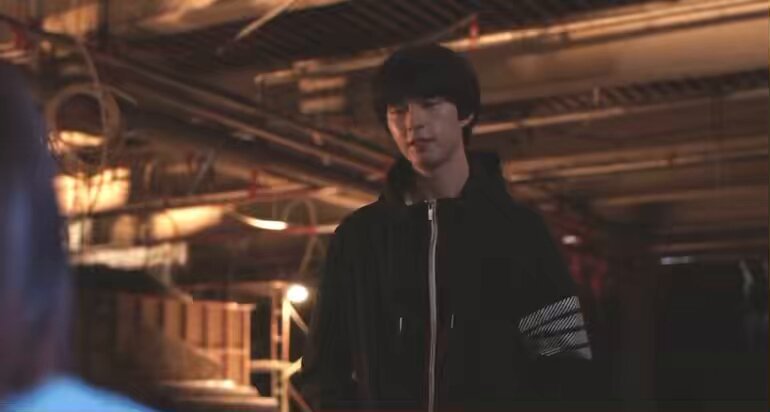
“Are you dating Ahn Su-ho? Relationships are all about give and take. That guy lets you sleep at his house and gives you a job. What have you given Su-ho in return?”
(This scene where he’s basically convinced that Su-ho and Yeong-i are sleeping together… and interrogates Yeong-i about it) reveals Beom-seok’s transactional view of relationships, shaped by his experience with conditional love. He couldn’t understand Su-ho’s kindness toward Yeong-i without assuming she was giving something back. Having never experienced unconditional love, Beom-seok finds it hard to take Su-ho’s goodwill at face value.
(아마, 수호와 영이가 잠자리를 하고 있을 것이라 거의 확신을 깔고… 영이를 까보는 이 장면은) 조건적 사랑에 대한 그의 경험으로 형성된 범석의 거래적 관계관을 드러낸다. 그는 영이가 무언가를 돌려주고 있다고 가정하지 않고는 영이에 대한 수호의 친절을 이해할 수 없었다. 조건없는 사랑을 경험한 적이 없었던 범석은 수호의 호의를 액면 그대로 받아들이기 어렵다.
Understanding the Ring Scene
Season 1 Episode 7 is known among fans as ‘that episode’… the one you need to mentally prepare yourself for before watching. The friendship between Su-ho and Beom-seok reaches its breaking point with escalating tension that hits a shocking climax at a completely unexpected moment, leaving viewers with unforgettable cinematic trauma.
The ‘ring’ sequence at the underground fighting venue where Su-ho goes serves as the ultimate release of all the psychological tension that had been building throughout these two boys’ relationship.
Hong Kyung’s acting in this scene is particularly noteworthy because he brilliantly conveyed that Beom-seok’s final act of violence wasn’t purely evil, but rather an impulsive explosion of all the conflicting love-hate emotions toward Su-ho that had accumulated during their brief but intense friendship.
시즌1 에피소드7화는 팬들 사이에서 ‘보기 전에 단단히 마음 먹고 봐야하는 ‘그’ 회차… 라고 일컬어질 정도로 수호와 범석이의 우정의 파국과 긴장감이 극에 달하다가 생각지도 못한 지점에서 충격적인 파국을 맞이하고, 보는 사람으로 하여금 쉽게 잊을 수 없는 시네마틱 트라우마를 안기기까지 한다.
수호가 찾아간 격투기 장의 ‘링’ 시퀀스는 이 두 소년의 관계 전반에 걸쳐 쌓여왔던 모든 심리적 긴장의 절정적 방출 역할을 한다.
이 장면에서 배우 홍경의 연기는 특히 주목할 만한데, 그가 범석의 마지막 폭력이 순전히 악한 것이 아니라 그들의 짧지만 강렬한 우정 동안 쌓인 수호에 대한 모든 상충하는 사랑-증오 감정의 충동적 폭발이었다는 것을 전달하는 데 너무나도 훌륭했기 때문이다.

When Beom-seok finally strikes Su-ho’s head in that final moment… the camera angles intentionally mirror the previous abuse scenes with his adoptive father.
This visual parallel suggests that Beom-seok was projecting all the hatred and pain from his father’s violence onto Su-ho. In this boy’s moment of rage, Su-ho becomes a symbol of everyone who had hurt Beom-seok, everyone who had abused their power over him.
범석이 마지막 순간에 수호의 머리를… 카메라 앵글은 의도적으로 양부의 이전 학대 장면들을 반영한다. 이 시각적 평행선은 범석이 그의 아버지의 폭력으로부터의 모든 증오와 고통을 수호에게 투사하고 있었다는 것을 암시한다. 이 소년의 분노의 순간에, 수호는 범석을 해쳤던 모든 사람, 그에게 권력을 남용했던 모든 이들의 상징이 되고만다.
I don’t think Su-ho had any idea he carried this kind of symbolic weight for Beom-seok. From Su-ho’s perspective, when he came to the fighting venue to find Beom-seok and confronted him, if Beom-seok had just accepted his request to ‘apologize to Si-eun and Yeong-i,’
He wouldn’t have fallen for the other bullies’ provocations, and the situation would have ended there. Sure, he knew Beom-seok hated him enough to sabotage his bike brakes and potentially cause a serious accident, but Su-ho couldn’t have known that his very existence was a projection of all the hatred that Beom-seok desperately yearned for yet violently resented.
수호가 범석에게 이런 상징적 무게를 지고 있다는 것을 전혀 몰랐을 것이라고 생각한다. 수호의 관점에서, 범석을 찾아 격투기 장으로 와 그와 마주했을 때, 범석이 ‘시은과 영이에게 사과해달라’라는 부탁을 받아들였다면 다른 일진들 도발에 넘어가지 않고 상황은 종료됐을 것이다.
바이크의 브레이크를 고장내서 큰 사고로 이어질 수 있었을 정도로 범석이 그를 증오하고 있다곤 생각했지만, 수호 그는, 자신의 존재 자체가 범석이 절실히 동경하고 원하면서도 폭력적으로 분개하게 되는 모든 증오를 투영하고 있다는 사실까진 알 수 없었을 것이다.
Romantic Feelings or Extreme Attachment?
While the drama doesn’t explicitly address Beom-seok’s sexual orientation
(This isn’t the main theme of the show – the brilliance of Weak Hero’s script lies in not trying to ‘define’ teenage emotions with a single word or label. It lets those shimmering, burning feelings naturally unfold for viewers to follow),
The script book details and directing choices portrayed in the show led me to personally interpret that there were somewhat romantic elements in his feelings toward Su-ho.
Especially reading through the deleted scenes of them drinking beer together by the Han River and going through the script book, I felt that Beom-seok’s admiration for Su-ho was implicitly close to love.
드라마가 범석의 성적 지향을 명시적으로 다루지 않는 반면
(본 드라마의 주제 자체가 아니다, 약한영웅 극본의 뛰어난 점은 10대들의 감정을 언어나 단어 한 가지로 ‘정의’ 내리려고 하지 않는다는 점에 있다. 아지랑이 같이 타오르는 감정을 보는 사람으로 하여금 자연스럽게 따라가게 놔둔다)
대본집 세부사항과 쇼에서 그려진 연출 선택들이 수호에 대한 그의 감정에 다소 로맨틱한 부분이 있다라고 개인적으로는 해석을 하였다.
특히 삭제된 한강 변에서 함께 맥주를 마시는 장면과 스크립트북을 읽으면서, 암시적으로 수호에 대한 범석이의 동경이 사랑에 가깝다라고 느꼈다.
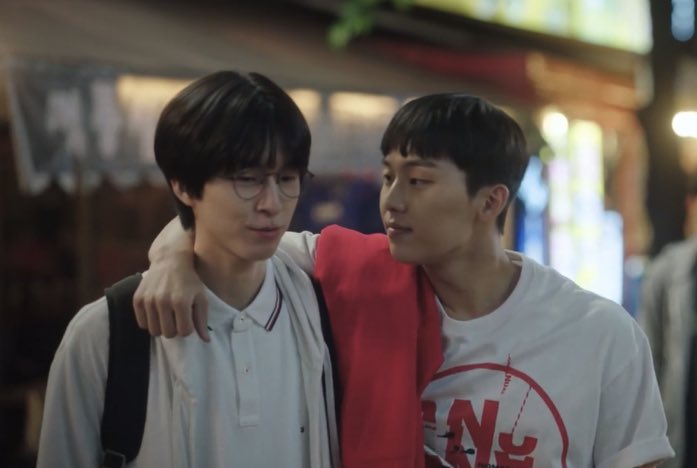
I felt that Beom-seok’s admiration for Su-ho was implicitly close to love..
But the question of whether these feelings were romantic is less important than understanding the intensity and impact these two characters had on each other that drove the drama.
Whether we categorise Beom-seok’s feelings as romantic love, intense admiration, or obsessive fixation, the result is the same: he placed Su-ho at the centre of his emotional universe in a way that was neither healthy nor sustainable.
하지만 이런 감정들이 로맨틱했는지의 질문은 두 캐릭터가 서로에게 끼친 극을 이끈 강도와 영향을 이해하는 것보다 덜 중요하다.
우리가 범석의 감정을 로맨틱한 사랑, 강렬한 동경, 또는 강박적 고착으로 분류하든, 결과는 동일하다: 그는 수호를 건강하지도 지속 가능하지도 않은 방식으로 자신의 감정적 우주의 중심에 두었다.
Su-ho became Beom-seok’s entire self-worth, his validation, his escape from trauma—a burden no single person should ever have to carry. The brilliance of Weak Hero’s script and direction lies in not simplifying or hastily defining these emotions with words.
Beom-seok’s feelings seem to exist somewhere between love and obsession, desperately burning anger and jealousy, and an unspoken but possible sexual attraction to the friend he admired.
수호는 범석의 전체 자존감, 그의 검증, 트라우마로부터의 탈출구가 되었다—어떤 한 사람도 짊어져서는 안 될 부담이나 다름없다. 약한영웅 각본과 연출의 탁월함은 이런 감정들을 단순화하거나 단어로서 섣불리 정의내리기를 하지 않는 데 있다.
범석의 감정들은 사랑과, 그리고 강박 사이, 절망적일 정도로 끓어오르는 분노와 질투, 명시되지 않았지만 그럴지도 몰랐을 동경하는 친구에 대한 성적인 끌림 사이의 곳곳에 존재했다고 보여진다.
This ambiguity makes his character more realistic and tragic, as real human emotions rarely fit into neat categories.
범석의 감정의 애매함은… 범석의 캐릭터를 더 현실적이고 비극적으로 만들어줬다, 실제로도 사람의 감정은 어떠한 깔끔한 범주에 맞아 떨어지지 않으니까.

The Cycle of Violence
Beom-seok’s story serves as a stark illustration of how childhood abuse creates cycles of violence. His adoptive father’s political ambitions and physical abuse directly contributed to creating someone who would eventually harm others.
The show doesn’t use this as an excuse for Beom-seok’s actions, but it presents it as a tragic reality while still holding him accountable for his choices.
범석의 이야기는 어린 시절 학대가 어떻게 폭력의 순환을 만드는지에 대한 뚜렷한 예시 역할을 한다. 그의 양부의 정치적 야망과 신체적 학대는 결국 다른 사람들을 해치게 될 누군가를 만드는 데 직접적으로 기여했다.
약한영웅에서는 이러한 불우한 서사를 범석의 행동에 대한 변명으로 사용하지 않지만, 여전히 그의 선택에 대해 책임을 지게 하면서 비극적 현실로 제시한다.
The most chilling aspect of Beom-seok’s character development is how logically his violence follows from his experiences.
He learned that might makes right, that the strong survive by dominating the weak, and that love must be earned through submission. These lessons, taught through years of abuse, became the foundation for his later actions.
범석의 캐릭터 발전에서 가장 오싹한 측면은 그의 폭력이 그의 경험들로부터 얼마나 논리적으로 따라오는가이다.
그는 힘이 옳다는 것, 강한 자가 약한 자를 지배함으로써 생존한다는 것, 그리고 사랑은 복종을 통해 얻어져야 한다는 것을 배웠다. 수년간의 학대를 통해 가르쳐진 이런 교훈들이 그 파괴적인 폭력의 기초가 되었으리라 본다.
However, the drama also shows us moments when Beom-seok could have chosen differently. His friendship with Si-eun and Su-ho definitely offered him hope for building relationships unconditionally, an alternative model for pure friendship.
But Beom-seok’s trauma responses were too deeply rooted for him to accept this as it was.
그러나 드라마는 또한 범석이 다르게 선택할 수도 있었던 순간들을 보여준다. 시은과 수호와의 우정은 그에게 조건없이 인간관계를 다져갈 수 있다는 희망, 순수한 우정에 대한 대안적인 모델도 분명히 제시했다고 본다.
하지만 범석의 트라우마 반응들이 이를 있는 그대로 받아들이기엔 너무 깊이 뿌리박혀 있었다.

Can Su-ho Ever Forgive?
The most actively discussed topic among fans about these two boys is: would Su-ho forgive Beom-seok if given the chance?
Given Su-ho’s character – the way he clearly compartmentalises emotions and handles them rationally – my opinion is probably not, but many fans had different views on this.
팬들 사이에서 두 소년 사이의 가장 활발히 논의되는 주제가 기회가 주어진다면 수호는 범석을 용서할 것인가?이다.
수호의 캐릭터 그러니까, 그가 감정에 대해 명확히 경계를 나누고 합리적으로 처리하는 성향으로 미루아보아, 내 생각은, 그럴 것 같지 않지만, 많은 팬들의 의견은 각기 달랐다.
A few days ago I told someone that I think Su-ho would casually accept Beom-seok’s apology – even if Beom-seok apologized, Su-ho would say “Okay, I understand, let’s forget about it.” Not because he forgave Beom-seok, but because his mindset isn’t weak enough to get stuck in the past.
Since it’s already over and he’s someone who needs to move forward, he would probably focus on the present now that he’s awake again—or knowing Su-ho’s personality, he would ‘pretend to’ do so. My opinion was that he would focus on the precious people in his life like his grandmother and Si-eun.
며칠 전 나는 한 분에게, 수호가 범석의 사과를 가볍게 받아들일 것이라고 생각한다고 말했다 – 범석이 사과했더라도, 수호는 “알겠어, 이해했어, 잊어버리자”라고 할 것이다. 범석을 용서했기 때문이 아니라, 그의 사고방식이 과거에 얽매일 만큼 약하지 않기 때문이다.
이미 끝난 일이고 그는 앞으로 나아가야 하는 사람이므로, 아마도 다시 깨어나게 된 현재에 집중할 것이라 생각한다, 혹은 수호의 성향 상 ‘그런 척’을 할 것이라는 게 나의 의견이었다 – 할머니와 시은 같은 그의 삶의 소중한 사람들에게 집중할 것이라고 느껴졌다.
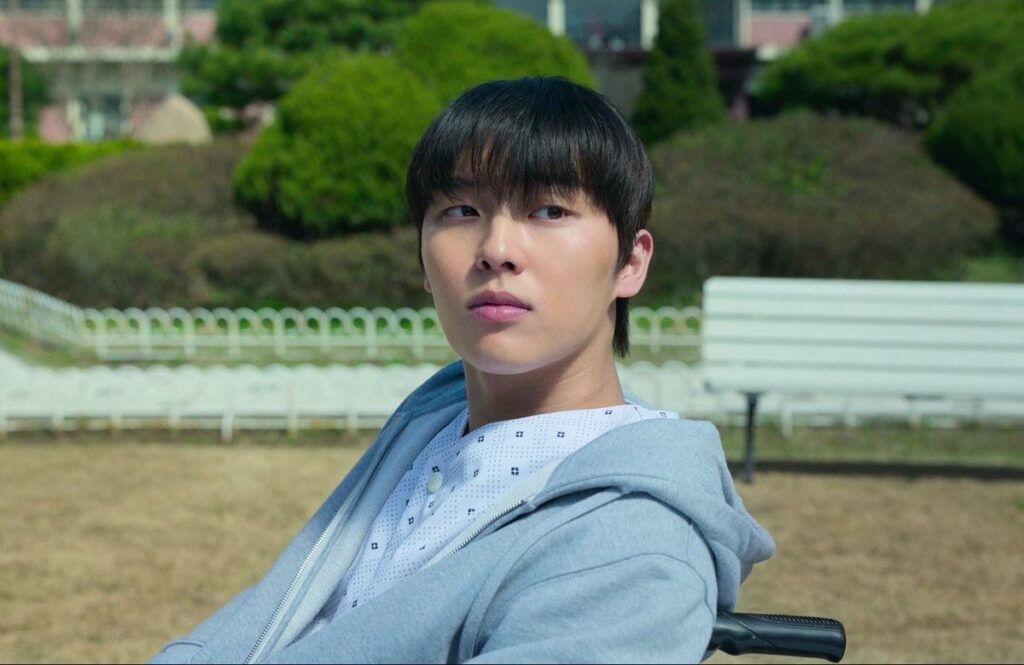
“잘 살았냐?”
The Performance That Brought It All to Life
Hong Kyung’s acting as Beom-seok was absolutely incredible with its nuanced portrayal of psychological complexity.
He managed to make us view Beom-seok as a boy we could feel sympathy for, successfully drawing him as someone who was both very vulnerable and very destructive at the same time.
Following the emotional trajectory that Hong Kyung created for Beom-seok, he didn’t try to convince me to accept or justify Beom-seok’s actions, but simply led me to ‘feel’ the psychological mechanisms of that destructive and shocking boy who kicked Su-ho’s head.. (The friend who was probably the most beloved person in his short 17-year life…)
범석에 대한 배우 홍경의 연기는 심리적 복잡성의 뉘앙스 있는 묘사로 너무도 대단했다. 그는 범석이라는 한 소년을 동정으로 바라볼 수 있게도 만들었고, 매우 취약하면서도 동시에 매우 파괴적인 인물로 그리는데 성공했다.
홍경이 그린 범석의 감정선을 따라가다보면 나에게 범석의 행동을 받아들이거나 납득하라고 설득하지 않지만, (17년이란 그의 짧은 삶에서 아마 가장 애정했을 대상인…) 친구의 머리를 걷어차버리는 그 파괴적이고 충격적이었던 소년의 심리적 메커니즘을 그저 있는 그대로 ‘느끼도록’ 끌고갔다.
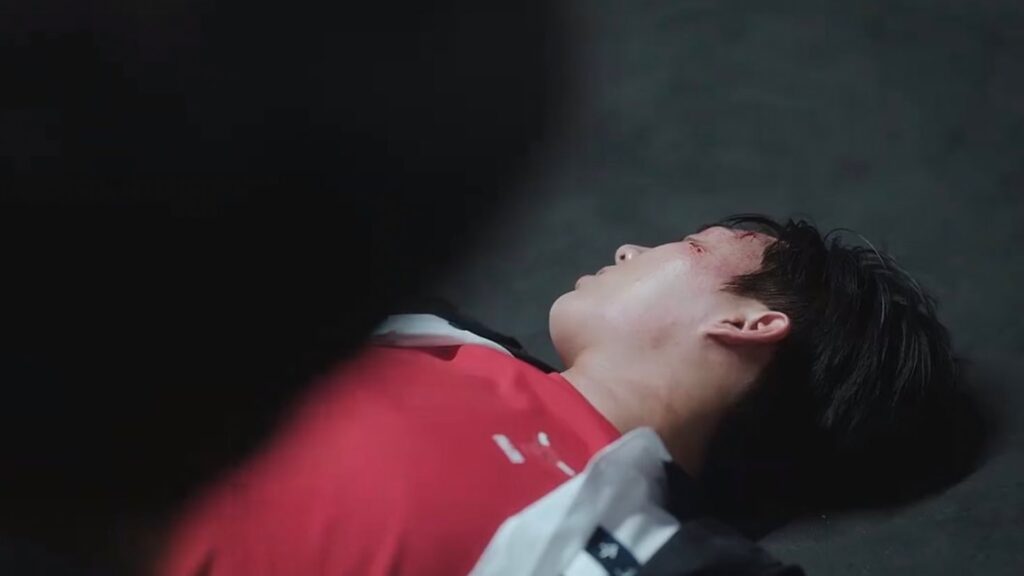
but simply led me to ‘feel’ the psychological mechanisms of that destructive and shocking boy who kicked Su-ho’s head..
What impressed me most was his ability to convey Beom-seok’s internal conflict, especially in Episode 7, where love and hatred become indistinguishable. I was amazed by the subtlety of his acting—the process of Beom-seok’s admiration for Su-ho transforming into extreme rage, his desperate level of longing for Su-ho’s recognition… turning into hatred.
내게 가장 인상적이었던 것은 범석의 내적 갈등을 전달하는 그의 능력이었다, 특히 사랑과 증오가 구별할 수 없게 되는 7화에서 말이다. 배우 연기의 미묘함에 놀랐다—수호에 대한 범석의 동경이 극에 달한 분노로 변하고, 수호로부터 인정받기 갈망하는… 절망적인 수준의 바람이 증오로 변색되는 과정 말이다.
So he convinced me that Beom-seok’s final act of violence wasn’t calculated evil—not asking for forgiveness or understanding—it was the destructive release of a young boy’s deep, unfulfillable deficiency, feeling he couldn’t get back what he gave to the friend he loved and admired most, and the deep friendship and love he felt he could never obtain from Su-ho.
After that, thanks to the actor’s portrayal of a teenage boy trembling and ‘not even knowing why he did it himself.’
그러니까, 범석의 마지막 폭력이 계산된 악이 아니라는 것을 납득시켰다, 용서나 이해를 바라는 게 아닌—그것은 가장 사랑하고 동경하던 친구에게 되돌려받지 못했다고 느낀 어린 소년의 절대 충족될 수 없는 깊은 결핍과, 수호로부터 결코 얻을 수 없다고 느꼈던 깊은 우정과 사랑에 대한 파괴적인 방출 후 ‘자기도 왜 그랬는지 모르겠다’ 덜덜 떠는 십대 소년을 표현한 배우의 묘사 덕분이었다.
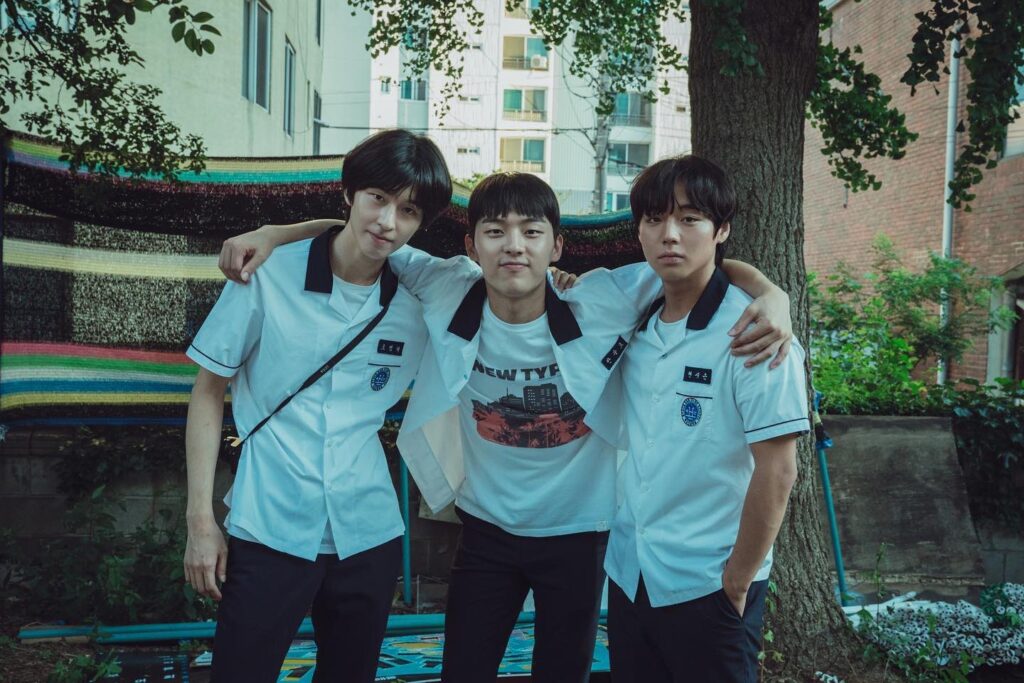
Same Tragic Ending
What’s interesting about fan analysis is that everyone sees the same character and scenes, but reaches different conclusions about Beom-seok’s psychology.
Some see a wounded child spiraling toward catastrophe based on trauma and fear of abandonment. Others see a boy who learned twisted patterns of love and control from an abusive environment, inheriting the bad habits of a terrible adult.
팬들의 분석에 있어서 모두가 같은 캐릭터와 장면들을 보지만, 범석의 심리에 대해 다른 결론에 도달한다는 점이 흥미롭다.
누군가는 트라우마와 버림받음의 두려움을 기반으로 파국으로 치닫는 상처받은 아이를 본다. 누군가는 학대적 환경에서 비틀린 사랑과 통제의 패턴을 배운, 못된 어른의 악습을 그대로 내려받은 소년을 본다.
But both analyses of the character agree on the fundamental tragedy – Beom-seok never learned healthy ways to process or express intense emotions. Whether you see Beom-seok as a traumatised child or someone with learned patterns of violent control, the result is the same:
A young person whose psychology was so damaged that violence became his primary language for dealing with love, disappointment, and loss.
하지만 캐릭터에 대한 두 분석 모두 근본적인 비극에 동의한다 – 범석은 강렬한 감정을 처리하거나 표현하는 건강한 방법을 배우지 못했다. 범석이를 트라우마를 입은 아이로 보든 폭력적 통제의 학습된 패턴을 가진 누군가로 보든, 결과는 동일하다:
심리가 너무 손상되어 폭력이 사랑, 실망, 상실을 다루는 그의 주요 언어가 된 소년.

young person whose psychology was so damaged that violence became his primary language for dealing with love, disappointment, and loss.
How Beom-seok Lost His Language of Love
Reading through countless thoughtful comments from international fans, what often surprised me was that fans of this drama genuinely enjoy not missing very detailed aspects, thinking about things from multiple angles, and drawing their own conclusions.
Many fans picked up on how Beom-seok wanted to show his affection not just through the ‘language of violence’ but also through sweet concepts like food. Beom-seok always goes around saying ‘I’ll buy it’ to Si-eun and Su-ho.
Then, to escape Gil-soo’s threats, he probably took on such a huge risk that if he’d been caught, he might have ended up hospitalized – selling his adoptive father’s watch to get a large sum of money. But when Su-ho and Si-eun wouldn’t accept it (naturally, those two saw Beom-seok as a true friend, and it’s only natural not to accept when a friend brings over ten million won), sadly Beom-seok lost his only way of saying “I love you guys” – through ‘currency’ Of course, Su-ho and Si-eun probably couldn’t even imagine Beom-seok’s depression over this.
수많은 해외 팬들의 정성스러운 코멘트를 읽으며 나를 종종 놀라게 한 점들은, 이 드라마의 팬들이 매우 디테일한 부분을 놓치지 않고 여러 각도로 생각해보고 자기만의 결론을 내려보는 걸 진심으로 즐겨한다는 점이었다.
많은 팬들이 범석이가 ‘폭력의 언어’ 뿐만아니라 음식과 같은 달달한 개념으로 자신의 애정을 보여주고 싶어한다는 점을 꼬집었다. 범석은 항상 시은과 수호에게 ‘내가 살게’ 라는 말을 달고 산다.
그러다, 길수의 위협에서 벗어나기 위해 아마 그로서는 발각됐을 경우 병원신세를 졌을지도 모를만큼 큰 리스크를 감내하고 양아버지의 시계를 팔아 큰 돈을 마련해왔지만 수호와 시은이 이를 받아들이지 않았을 때 (당연하다, 그 둘은 범석이를 진정한 친구로 여기고 있었고, 친구가 천만원이 넘는 돈을 가져오면 받지 않는 게 당연하지 🤷🏻♀️)
안타깝게도 범석은 “너희들을 사랑해”라고 말하는 자기의 유일한 방법, ‘화폐’를 잃었다. 물론 수호와 시은은 그러한 범석의 우울을 상상조차 하지 못했을 것이다.
Unlike Yeong-bin, Jeong-chan, and Tae-hun’s bully group who he had gained attention and favor from through money, Su-ho and Si-eun truly saw Beom-seok as a friend. Anyway, when his only means of expressing love and affection – ‘money’ – didn’t work, the boy had no other healthy way to communicate his feelings.
Now, ironically, violence became his only remaining strategy for showing love, which is so heartbreaking.
The series of actions Beom-seok showed toward Su-ho, who became an object of love-hate after Yeong-i’s appearance – provocatively testing Su-ho in the cafeteria like ‘I’m this angry.
Are you going to hit me too (like my adoptive father, like the Moon-gang bullies)?’ or sabotaging the brakes of Su-ho’s bike, which was essentially his ‘lifeline’ in many ways, leading to a serious accident… and needless to say, the destructive actions on the ‘ring’ – all became the boy’s only remaining strategy for showing affection.
그가 화폐를 매개로 관심과 호감을 얻었던 영빈, 정찬, 태훈 일진 무리들과는 달리, 수호와 시은은 진정으로 범석을 친구로 여겼다. 어쨌든 사랑과 애정을 드러내는 본인의 유일한 수단인 ‘화폐’가 작동하지 않자, 소년은 자신의 감정을 소통할 다른 건강한 방법이 없었다.
이제는, 아이러니하게도 폭력이 사랑을 보여주는 그의 유일한 남은 전략이 되었는데, 너무나도 가슴이 아프다.
영이 등장 이후로 애증의 대상이 된 수호에게 범석이 보이는 일련의 행동들 – 급식실에서 ‘내가 이렇게 화났어. 너도 (내 양아버지처럼, 문강고 일진들처럼) 나를 때릴거냐?’ 라고 떠보듯 수호를 도발하거나, 여러의미로 수호의 ‘생명줄’ 이나 다름없는 바이크 브레이크를 고장내 큰 사고로 이어지게 하거나.. 그리고 말할 것도 없이 ‘링’ 위에서의 파괴적인 행동은 소년에게 남은 애정을 보이는 유일한 전략이 되어버렸다.
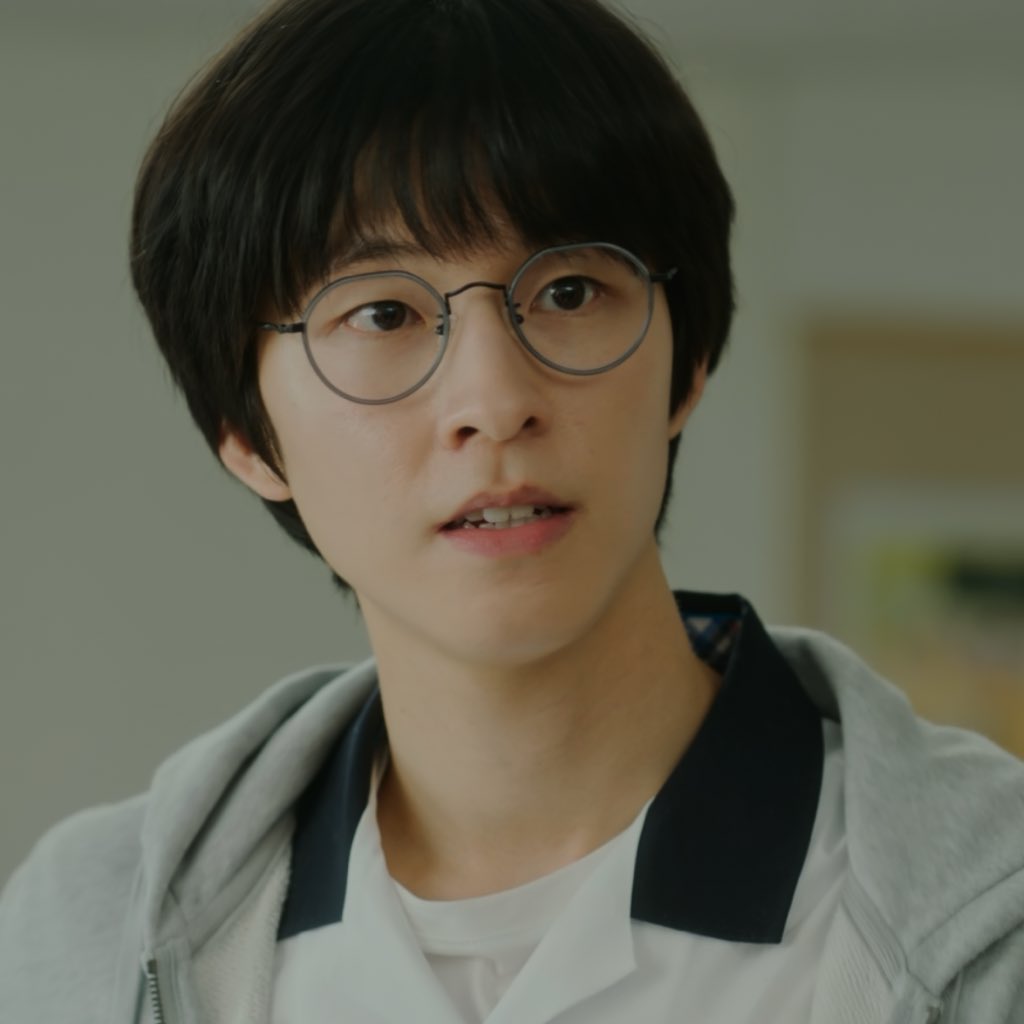
Now, ironically, violence became his only remaining strategy for showing love, which is so heartbreaking.
When Love Isn’t Enough
I think the relationship between Beom-seok and Su-ho portrayed in Weak Hero Class 1 will remain one of the most complex and heartbreaking dynamics I’ve seen in K-dramas.
(The scene in Episode 7 where Beom-seok kicks Su-ho’s head will remain a cinematic trauma for a very long time, and I can’t help but think it’s one of the masterpiece scenes…)
The excellent script, equally excellent acting, and direction showed how Beom-seok’s psychology could be revealed in such a realistic yet destructive way.
내 생각에 약한영웅 클래스1에서 그려낸 범석과 수호의 관계는 그동안 한국 드라마에서 본 가장 복잡하고 가슴 아픈 모습 중 하나로 남을 것이다.
(7화에서 범석이 수호의 머리를 걷어차 버리는 그 장면은, 굉장히 오랫동안 시네마틱 트라우마로 남을 것이고, 그리고 어쩔 수 없이 명장면 중 하나라고 생각한다…)
훌륭한 각본과 그만큼 훌륭한 배우들의 연기, 연출이 한 소년의 심리를 현실적이고도 이토록 파괴적인 방식으로 드러낼 수 있는지 보여주었고, 놀라웠다.
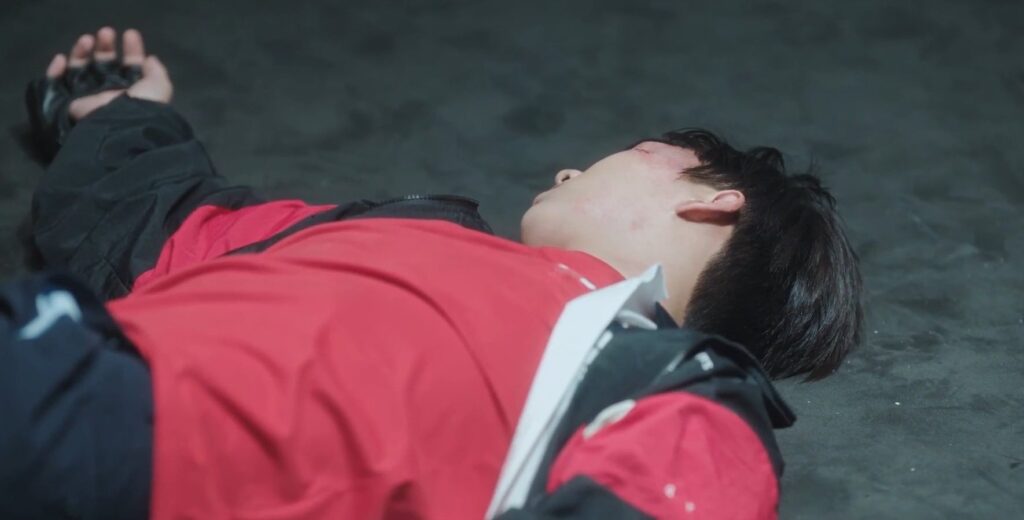
Why Beom-seok Destroyed Su-ho
Meanwhile, questions about these translations and nuances keep coming from channel subscribers, and I felt the need to organize thoughts about these two characters I’ve been analyzing for fans who still need to understand the characters through subtitles.
One subscriber asked about Beom-seok’s tone toward Si-eun in Episode 3 – whether “What are you going to do if something happens to Su-ho?” sounded accusatory or if it was just from anxiety.
I explained the Korean translation and nuanced context, and that subscriber replied: “The words sound quite harsh, but Beom-seok’s intention doesn’t necessarily seem to be blame; it seems like the poor kid said that because of extreme anxiety about his precious new friend. He seemed scared that Su-ho might die.”
한편, 채널 구독자들로부터 이런 번역과 뉘앙스에 대한 질문들이 계속 이어지고 있고, 여전히 자막을 통해 캐릭터들을 이해해야 하는 팬들을 위해 그동안 분석해온 두 캐릭터에 대해 정리할 필요를 느꼈다.
어느 구독자가 3화에서 시은을 향한 범석의 어조에 대해 물었다 – “수호 잘못되면 너 어떡하려고 그래?”라는 말이 비난조로 들렸는지 아니면 그냥 불안해서 그런 건지. 한국어 번역과 뉘앙스 적인 맥락을 알려줬고, 그 구독자가 다시 답했다: “말은 꽤 강하게 들리지만, 범석의 의도가 반드시 비난은 아닌 것 같다; 불쌍한 아이가 소중한 새 친구에 대한 극도의 불안 때문에 그런 말을 한 것 같다. 수호가 죽을까 봐 무서웠던 것 같다.”
Reading the comments, I sometimes come across analyses that make me suspect they might be studying psychology or working professionally in that field. They share excellent perspectives on why Beom-seok destroyed Su-ho in the ring.
One subscriber focused on calling Beom-seok ‘a big body with a child inside who hasn’t fully grown up’ – basically that underneath all the violence he experienced and the manipulation he uses to control people, there’s a pitiful boy who never learned how to give and receive unconditional love or healthy ways to cope with being ‘rejected’ or sometimes ‘abandoned.’
코멘트를 읽다보면 심리학을 공부하거나 직업적으로 그 필드에 있지 않을까 추측이 되는 수준의 분석이 전해지기도 한다. 범석이 수호를 링에서 파괴하게 된 근본적인 원인에 대한 탁월한 관점들을 얘기한다.
한 구독자는, 범석이를 ‘몸은 크지만 다 자라지 못한 아이가 그 안에 있다’라고 부르는 것에 초점을 맞췄다 – 기본적으로 그가 경험한 모든 폭력과 사람을 조정하는 ‘매니퓰레이션’ 기저에는 조건없는 사랑을 주고 받는 방법이나 ‘거절당하거나’, 때때로 ‘버려지는’ 상황에 대해 대처하는 건강한 방식을 전혀 배우지 못한 가련한 소년이 있다-라는 점이다.
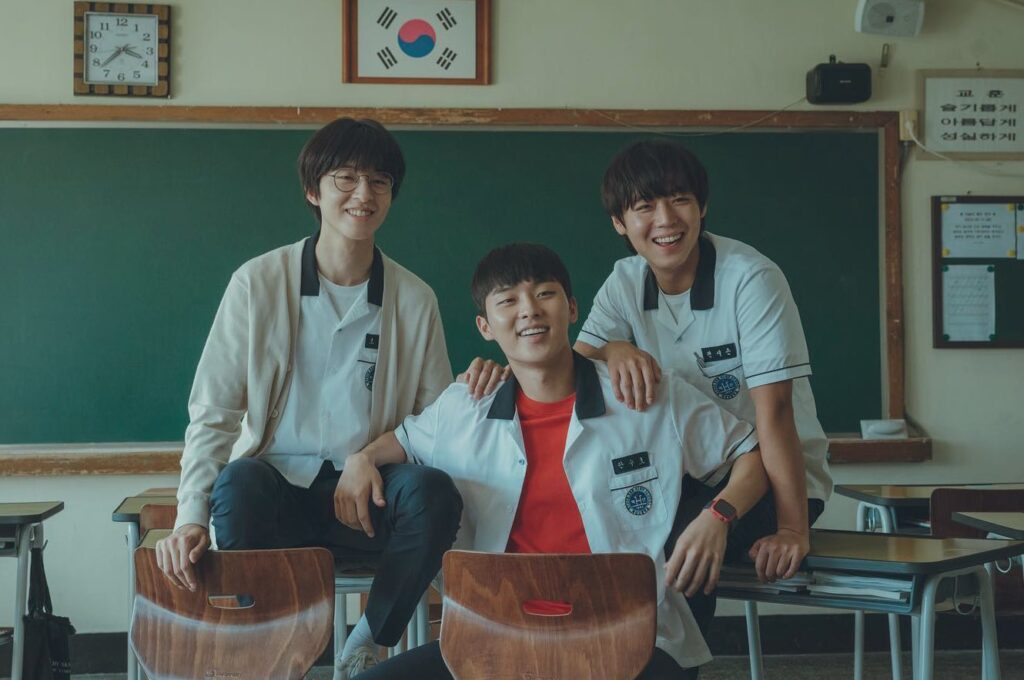
The Inner Child Theory: When Trauma Creates a Broken Little Boy
According to this subscriber, every time Su-ho and Si-eun showed friendship to Beom-seok, you could literally see the child inside Beom-seok who hadn’t fully grown up light up. They described this as “a child tasting warmth for the first time,” and because this warmth was so foreign yet sweet to Beom-seok, he became afraid of losing this feeling.
When he was finally consumed by the fear that this happiness could be taken away overnight, depending on the choices, control, or will of those who gave it to him, he eventually came to resent and then hate those very people.
이 구독자에 따르면, 수호와 시은이 범석에게 우정을 보일 때마다, 말 그대로 범석 안의 다 자라지 못한 아이가 빛나는 것을 볼 수 있었다고 한다. 그들은 이것을 “처음으로 따뜻함을 맛보는” 아이로 묘사했고, 이 따뜻함이 범석에게 너무 낯설면서도 달콤했기 때문에 이 감정을 잃는 것을 두려워하고, 마침내 그 행복함을 주는 대상의 선택이나 통제 혹은 의사에 따라 하루아침에도 빼앗길 수 있단 두려움에 사로잡혔을 때 마침내 그 대상 자체를 원망하다 증오하게 된다.
The Power Dynamics Theory: When Love Becomes Control
One subscriber tried to understand Beom-seok through a different approach. While most subscribers focused on the wounded inner child within Beom-seok’s character, this fan said they saw something much more calculated and disturbing in Beom-seok. They felt that ‘Beom-seok never had deep admiration for Su-ho in the first place.’
Instead, they understood that Beom-seok learned a twisted lesson from his adoptive father: “Love someone enough to teach them by hitting them when that loved one disappoints you.”
The adoptive father adopted Beom-seok and supposedly loved him enough to save him from poverty, right? But he hit him when Beom-seok fell short of expectations and made mistakes.
This twisted parenting style of the adoptive father would have influenced Beom-seok’s twisted logic, and according to this logic, if the friend he cared about most fell short of expectations and made mistakes… Su-ho deserved to be hit too.
So this fan’s analysis was (🥶 a bit creepy but… interesting!) that from the perspective of interpreting the same sequence from multiple angles being the viewer’s freedom, the ring scene was essentially Beom-seok treating Su-ho the way his adoptive father had treated him—a direct projection of love through control and power.
한 구독자는, 다른 접근으로 범석이를 이해하려고 했다. 대부분의 구독자가 범석이라는 캐릭터 안에서 상처받은 내면의 아이에 집중하였으나, 이 팬은 훨씬 더 계산적이고 불안한 무언가를 범석 안에서 보았다고 하였다. 애초에 범석에게는 ‘수호에 대한 깊은 동경은 결코 없었다-‘ 라고 느꼈다고 한다.
대신, 그들은 범석이 양부로부터 “누군가를 사랑하는 만큼 그 사랑하는 대상이 너를 실망시킬 때는 때리는 것으로서 가르쳐라” 라는 비틀린 교훈을 배웠다고 파악했다.
양부는 범석을 입양했고 어쨌든 그를 가난에서 구해줄 만큼 사랑했다고 여겨지지 않나? 하지만 범석이 그의 기대에 못 미치고 실수할 때는 때렸다. 이렇게 범석의 비틀린 논리에는 이러한 양부의 비틀린 양육 방식이 작용했을 것이며, 이러한 범석의 논리대로라면, 그가 가장 애정하는 친구가 기대에 못 미치고, 실수를 한다면.. 수호도 맞을 자격이 있다라는 것이다.
그러니 이 팬의 분석은, (🥶 좀 으스스하긴 하였으나…흥미로웠다!) 같은 시퀀스를 여러 각도에서 파악하는 것은 보는 사람의 자유라는 점에서 볼때, 링 장면은, 범석이 양부가 자신을 대했던 방식으로 수호를 대하는 것과 마찬가지였고, 실제로는 사랑하는 이에 대한 통제와 권력의 방식이 그대로 투영되었다– 라고 판단했다.

The Foundation of Obsession
But to truly understand the depth of the final tragedy, we need to return to Beom-seok’s psychology, his foundation. Following the drama and script book, what emerges – though not explicitly suggested – is ultimately a portrait of someone who has never experienced unconditional love or emotional stability.
(And many fans have confessed to seeing ‘themselves’ in Beom-seok…)
하지만 마지막 비극의 깊이를 진정으로 이해하려면, 범석의 심리, 기저로 돌아가야 한다. 드라마와 대본집을 따라 읽다보면, 명시적으로 암시하지 않지만 결국 드러나는 것은 무조건적인 사랑이나 감정적 안정을 경험한 적이 없는 누군가의 초상이다.
(그리고 많은 팬들이 범석에게서 ‘자신’의 얼굴을 본다고 고백해왔다…)
As an orphan later adopted by politician Oh Jin-won, Beom-seok grew up in an environment where love was conditional and often violent. His adoptive father’s political career took precedence over nurturing, and when Beom-seok failed to meet expectations, he faced physical and emotional abuse.
정치인 오진원에게 입양된 고아로서, 범석은 사랑이 조건적이고 종종 폭력적인 환경에서 자랐다. 그의 양부의 정치적 경력이 양육보다 우선시되었고, 범석이 기대에 부응하지 못할 때는 신체적, 정서적 학대에 직면했다.
What felt particularly unsettling about Beom-seok wasn’t his dramatic final act of violence, but the very narrative of Beom-seok that led to that destructiveness.
The boy’s insatiable need for validation (especially from his most beloved friends… Su-ho and Si-eun were just ordinary seventeen-year-old boys…), his inability to accept boundaries, his tendency to test relationships through manipulation, and the learned violence that eventually erupts when situations don’t go his way—these are patterns that exist in our reality, in actual relationships, in actual schools, in actual workplaces.
범석에 대해 특히 불안하게 다가온 점은, 그의 극적인 마지막 폭력 행위가 아니라 그 파괴성으로 이어지는 범석의 서사 그 자체이다.
소년의 결코 채워질 수 없는 인정 욕구 (특히, 가장 애정하는 친구들로부터.. 수호와 시은은 그저 평범한 열일곱의 소년일 뿐이었다..) 경계를 받아들이지 못하는 무능력, 조작을 통해 인간 관계를 시험해보려는 경향, 그리고 상황이 자신의 뜻대로 되지 않을 때 결국 분출되는 학습된 폭력성—이것들은 우리 현실의, 실제 관계에서, 실제 학교에서, 실제 직장에서 존재하는 패턴들이다.
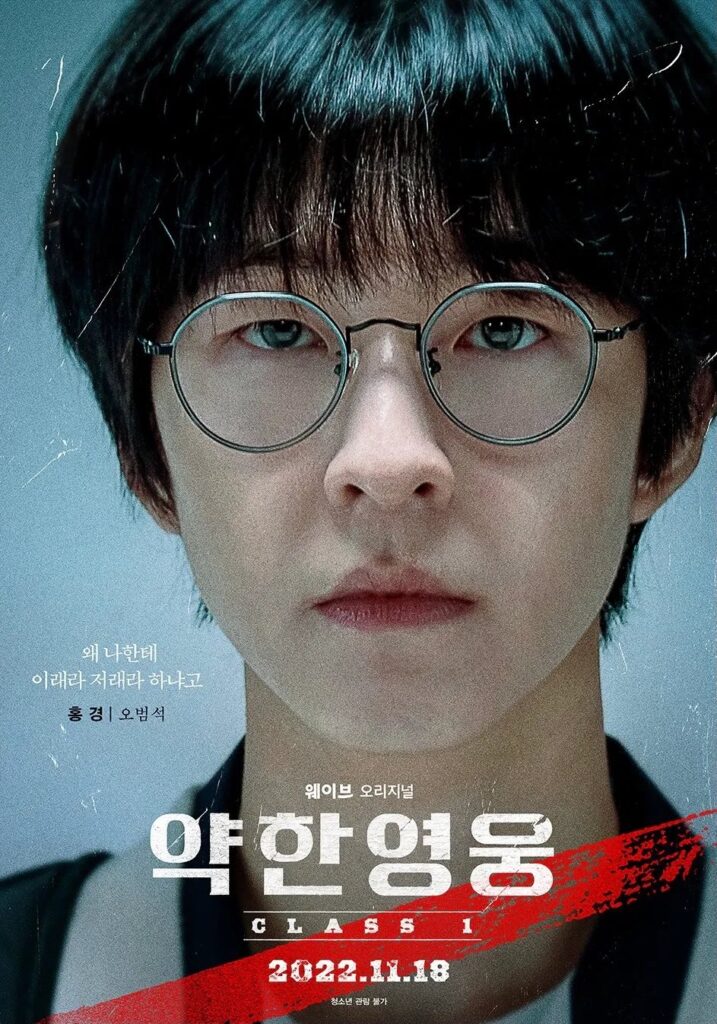
Script Book Revelations
Because I was so obsessed with getting inside Beom-seok’s head, I ended up buying the official script book (yeah, I’m down that deep 😂). There, I discovered details that completely changed my understanding of their relationship dynamics.
범석의 마음속을 들여다보는 것에 너무 몰두한 나머지, 결국 공식 대본집… 까지 사게 되었다 (그래, 이 정도로 깊이 빠졌다 😂). 거기서 그들의 관계에 대한 나의 이해를 완전히 바꾼 디렉션들이 있었다.
In the deleted Han River scene where Su-ho and Beom-seok come out after playing pool and drink beer together, the script includes specific directions: “When Su-ho puts his arm around Beom-seok’s shoulder, he smiles shyly,” “He agrees with and laughs at everything Su-ho says”…
수호와 범석이 포켓볼을 치고 나오고, 함께 맥주를 마시는 삭제된 한강 장면에서, 대본에는 특정 디렉션이 포함되어 있는데, “수호가 범석이 어깨에 팔을 두르면 수줍게 웃는다”, “수호가 말하는 모든 것에 동의하고 웃는다”…

When I personally felt about it, this direction didn’t seem like a portrayal of ordinary boys’ friendship. (This is a very personal perspective!)
Looking at this direction, upon reflection… I couldn’t help but wonder if the production team had ever explicitly given similar directing to Si-eun when he was with Su-ho.
Beom-seok “smiling shyly when Su-ho puts his arm around his shoulder” and “agreeing with everything Su-ho says”… these directions reminded me of someone whose heart is fluttering when alone with their romantic interest, like a first date scene.
내가 개인적으로 느꼈을 때, 이러한 디렉션은 일상적인 소년들의 우정의 묘사는 아니게 느껴졌다. (매우 개인적인 관점이다, 물론) 이 디렉션을 보았을 때, 가만히 짚어보면… 연출 상으로 제작진이 시은이 수호와 함께 있을 때 시은에게도 비슷한 연출을 명시적으로 디렉팅 준 적이 있는지 궁금하지 않을 수 없었다.
범석이 “수호가 어깨에 팔을 두르면 수줍게 웃는다” “수호가 말하는 모든 것에 동의한다”… 이러한 디렉션이, 내게는 마치 좋아하는 이성과 단둘이 있을 때 심장이 두근거리는 누군가가 처음으로 데이트하는 장면을 연상케 했다.
What further convinced me in my personal interpretation… was the scene right before Beom-seok meets Si-eun, Su-ho, and Yeong-i at the cafe on the weekend – the scene where Beom-seok arranges his hair while looking at himself in a full-length mirror before checking Su-ho’s Instagram.
Considering that this drama had the pressure of containing all the characters’ narratives and vast storylines, and there were only 8 episodes, I viewed every scene as compressed and meaningful within itself.
So the intentional choice to include a close-up of Beom-seok arranging his hair and checking his appearance in the mirror seemed to me like a hint – though not explicitly mentioned or defined – suggesting his sexual feelings toward Su-ho.
In a drama where every minute and second of scenes are symbolic and meaningful, why would they spend time on a close-up of him fixing his hair unless they intended to convey something specific about Beom-seok’s emotional state and intentions?
Of course, the fun of watching the precarious boundary between friendship among cute-looking boys and the intense bromance undertones throughout the drama is an emotion that anyone watching this show feels, and Si-eun and Su-ho’s strong bromance is welcomed everywhere and delights fans.
But honestly, in terms of this drama’s direction, I didn’t feel even a single directorial ‘hint’ suggesting that Si-eun had sexual feelings toward Su-ho, compared to the ‘suggestive direction’ given to Beom-seok.
Su-ho is officially (as the director revealed) Si-eun’s ‘first love,’ but this is because Su-ho made the thoroughly self-isolated Si-eun feel for the very first time a flood of countless emotions – friendship, respect, admiration, awe, happiness, laughter, anxiety about possibly losing someone precious – and if there was one word that could contain this flood of various emotions, it could only be platonic ‘first love.’
개인적 해석에 더욱 설득을 당겼던 점은… 시은, 수호, 영이와 주말에 카페에서 만나기 바로 전 장면으로, 범석이 수호의 인스타그램을 보기 전에 자신의 머리를 전신 거울을 보며 정돈하는 장면이다. 이 드라마가 모든 캐릭터의 서사와 방대한 스토리라인을 담아야 하는 압박이 있고, 에피소드는 8화밖에 없었다는 점을 고려하면, 모든 장면은 압축된 채 그 안에 의미를 가졌다고 보았다.
그래서 범석이 거울에서 머리를 정돈하고 외모를 확인하는 클로즈업을 포함시키는 의도적인 선택이 내게는 수호에 대한 그의 성애적인 감정을 암시하는, 물론 명시적으로 언급되거나 정의되지 않지만, 일종의 힌트가 아니었을까 싶다. 모든 일분일초의 장면이 상징적이고 의미가 있는 극에서, 범석의 감정 상태와 의도에 대해 특정한 무언가를 전달하려는 의도가 아니라면 왜 머리를 매만지는 클로즈업에 시간을 할애했을까?
물론, 귀엽게 생긴 소년들끼리 빚어내는 우정과 극 전체적으로 진하게 깔린 언더톤 브로맨스의 아슬아슬한 경계를 바라보는 재미는 이 드라마를 보는 누구나 느끼는 감정이고 그러한 지점에서 시은과 수호의 끈끈한 브로맨스는 어디서나 환영받고 팬들을 즐겁게 하지만 솔직히 이 드라마의 연출 상 시은이 수호에게 성애적인 감정을 가졌다고 느껴지는 연출적인 ‘암시’는 범석이에게 주어진 ‘암시적인 연출’에 비한다면, 단 한 군데도 나에게는 느껴지지는 않았다.
수호는 공식적으로도 (감독님께서 밝혔듯이) 시은의 ‘첫사랑’인데, 수호로 하여금 철저히 스스로를 고립했던 시은이 난생 처음으로 느낀 수많은 감정의 홍수들- 우정, 존경심, 동경심, 경외, 행복, 웃음, 소중한 존재를 잃을지도 모른다는 불안함 – 이 모든 갖가지 감정의 홍수를 담을만한 단 한 가지 단어가 있다면 그것은 플라토닉한 ‘첫사랑’ 밖에 없었기 때문이리라 본다.

Considering that this drama had the pressure of containing all the characters’ narratives and vast storylines, and there were only 8 episodes, I viewed every scene as compressed and meaningful within itself.
The Instagram Incident
The scene that actually made me chuckle (not in a bad way) was when even at the club with Jeong-chan’s group, Beom-seok was still hanging onto his obsessive fixation on Su-ho, agonizing over whether or not to unfollow him on Instagram… that expression on Beom-seok’s face that looked like he was about to crumble at any moment.
Beom-seok’s expression as he held drinks and went to hit on the older girls to fit in with Jeong-chan’s group also… made me chuckle (not in a bad way). Even in the moment when he went to the table with the girls and gulped down a drink, his head was still completely filled with his obsession about Su-ho.
실제로 보다가 너털웃음에 가까울 정도로 실소한 장면은 (나쁜 뜻이 아니다) 정찬 무리들과 클럽에 가서도 여전히 수호에 대한 강박에 가까운 집착 때문에 인스타그램 팔로우 취소를 할까말까 매달려 있던… 그 당장이라도 무너질 것 같은 범석이의 표정이었다.
정찬 무리들과 어울리기 위해 술을 들고 누나들에게 대시하러 가는 범석이의 표정은… 역시 (나쁜 뜻이 아님) 실소를 나오게 했다. 누나들이 있는 테이블로 가서 술 한잔 벌컥 마시는 그 순간조차도 머릿 속에는 수호에 대한 강박으로 가득 차 있었다.

that expression on Beom-seok’s face that looked like he was about to crumble at any moment.
The Instagram follow situation serves as the perfect microcosm of Beom-seok’s psychological state and his relationship with Su-ho.
On the surface, it seems like a trivial teenage concern—who follows whom on social media. But for Beom-seok, this became a symbol of acceptance versus rejection, inclusion versus abandonment.
인스타그램 팔로우 사건은, 범석의 심리 상태와 수호와의 관계의 완벽한 축소판 역할을 하는데, 표면적으로는 사소한 십대의 관심사—누가 소셜미디어에서 누구를 팔로우하는가—처럼 보이지만, 하지만 범석에게는 이것이 수용 대 거부, 포함 대 버림받음의 상징이 되어버렸다.
When Beom-seok discovered that Su-ho followed Yeong-i but didn’t respond to his own follow request, it confirmed his vague fear about his own worth and where he stood with his most beloved friend – that he might be ‘an unimportant existence.’
For a teenager with abandonment trauma, the meaning of social media interactions isn’t simple.
Honestly, seeing news about teenagers making extreme choices because of social media isn’t uncommon, so I think addressing social media incidents in the drama was a realistic choice.
The brilliance of this plot device lies in the ‘familiarity’ of our reality. Most viewers, even if they wouldn’t react as extremely as Beom-seok, can fully understand the pain of social media rejection, and this isn’t necessarily something you feel more sensitively just because you’re a ‘teenager.’
범석이 수호가 영이를 팔로우했지만 자신의 팔로우 요청에는 답하지 않았다는 것을 발견했을 때, 그것은 자신의 가치와 가장 애정하는 친구에게서 자신의 위치가 어디인지 막연히 ‘중요하지 않은 존재는 아닐까…’ 라는 막연한 그의 두려움을 확인시켜주었다.
결국 버림받는다는 트라우마를 가진 십대에게 소셜미디어 상호작용이 가지는 의미는 단순하지 않다.
솔직히, 소셜미디어 때문에 극단적인 선택을 하는 십대들에 대한 뉴스도 심심치 않게 전해지는 것을 보면, 극에서 소셜미디어 사건에 대해 다룬 것은 현실적인 선택이었다고 생각한다. 이 플롯 장치의 탁월함은 우리가 살고 있는 현실의 ‘익숙함’에 있다.
대부분의 시청자들은 범석만큼 극단적으로 반응하지 않더라도 소셜미디어 거부의 아픔을 충분히 이해할 수 있고 여기에는 반드시 ‘십대’라서 더욱 민감하게 느낀다- 라고 할 수 없을 것이다.
What makes this incident even more heartbreakingly dramatic is that Su-ho probably had no idea about the importance Beom-seok placed on social media interactions that weren’t particularly valuable to him.
Su-ho’s casual approach to social media versus Beom-seok’s desperate obsession with recognition and acceptance also represented a fundamental mismatch between the two friends in how those two boys processed their emotions.
이 사건을 더욱 가슴아프게 극적으로 만드는 것은 수호가 아마도 범석이… 본인에게는 그닥 가치 있지 않은 소셜미디어 상호작용에 두는 중요성에 대해 전혀 모르고 있었을 것이라는 점일 것이다.
소셜미디어에 대한 수호의 가벼운 접근 대 범석의 절망적인 인정과 수용에 대한 강박은 두 친구의 근본적인 불일치를 나타내기도 했다—그 두 소년이 자신의 감정을 처리하는 방법에 있어서 말이다.

The Test of Violence
One of the most interesting analyses I encountered from international fans was when they offered a new perspective from a scope that many people missed or didn’t think about.
Su-ho’s physical violence toward Beom-seok – the visible violence and how it started to derail the two boys’ relationship – for instance, Su-ho forcefully pushing Beom-seok against the wall at the karaoke room or (though it was due to Beom-seok’s provocation…) Su-ho’s choice to deliberately push Beom-seok in the school cafeteria to teach him a lesson – these weren’t simply moments of conflict.
From Beom-seok’s perspective, there was a comment saying it was a destructive betrayal by his friend.
내가 해외 팬들로부터 접한 가장 흥미로웠던 분석 중 하나는 많은 사람들이 놓치거나 생각지 않았던 범위에서 새로운 시각을 제시할 때 였던 것 같다.
범석에게 가해진 수호의 물리적인 폭력, 그러니까 눈에 드러나는 폭력과 이로 인해 두 소년의 관계가 어떻게 빗겨나가기 시작했는지, 이를테면 노래방에서 수호가 범석이를 강하게 벽으로 밀치는 행위나 (물론 범석의 도발로 인해서였으나…) 학생 식당에서 의도적으로 범석에게 교훈을 주기 위해 밀치는 수호의 선택은 단순한 갈등의 순간이 아니었다—범석의 관점에서는 자신에 대한 친구의 파괴적인 배신이었다고 말한 코멘트가 있었다.
Even if Su-ho and Si-eun didn’t fully understand the extent of abuse Beom-seok endured, they were aware that Beom-seok was a major victim of school violence.
Looking at this narrative through that lens, for a boy with deep trauma from various forms of violence like Beom-seok, violence from Su-ho would have been even more destructive, regardless of his intentions.
수호와 시은은 범석이 감내하는 학대 정도를 완전히 이해하지 못했더라도, 그들은 범석이 학교 폭력의 큰 피해자인 점을 인지하고 있었다.
이런 서사를 빗대어 보자면, 범석과 같은 여러가지 모습의 폭력에 깊은 트라우마를 지닌 소년에게는 수호로부터의 폭력이 그 의도가 어찌됐든 더욱 파괴적으로 다가왔으리라는 점이다.
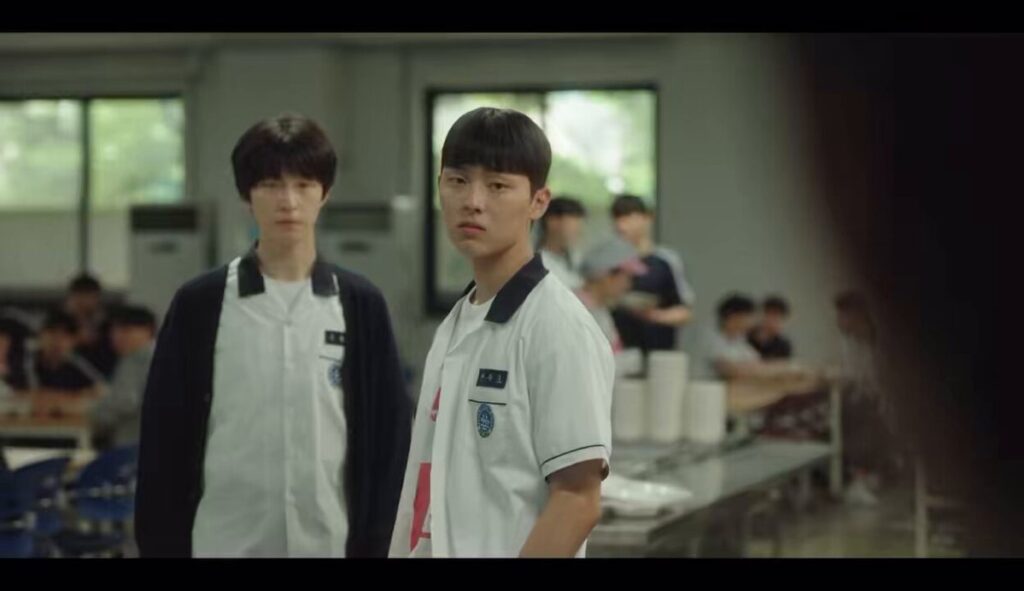
‘This guy is done… he’s crossed my ‘boundary’
Through this lens, the cafeteria scene became particularly tragic, according to a comment.
Beom-seok seemed to be testing Su-ho—would Su-ho treat him the same way his adoptive father and those bastards from Moon-gang High did? From Beom-seok’s perspective, when Su-ho succumbed to his sense of justice and feelings of anger toward his corrupted friend, he failed miserably in Beom-seok’s test.
이런 렌즈를 통해 볼 때 식당 장면은 특히 비극적이 되었다, 라는 코멘트가 있었다.
범석이 수호를 시험하고 있는 것처럼 보인다—수호가 그의 양아버지, 문강고의 그 씹새끼들이 했던 것과 같은 방식으로 그를 대할 것인가? 범석이의 입장에서는, 수호는 본인의 정의감과 변질된 친구에 대한 분노의 감정에 굴복했을 때, 그는 범석이의 시험에서 처참하게 실패했다.
The fact that Su-ho looked at Si-eun for so long before forcefully pushing Beom-seok against the table, signalling ‘This guy is done… he’s crossed my ‘boundary’ suggests that Su-ho perfectly understood and controlled what kind of physical penalty would be imposed on Beom-seok, and this also represents the death of the idealised, admired friend within Beom-seok.
The friend that Beom-seok, with his fundamental anxiety about people, had placed on the inner scale and pedestal as the most admired and loved – that friend who should have been different from all the other people who had hurt Beom-seok – proved in that moment that he too could inflict the same violence on him. For Beom-seok, this wasn’t simply a humiliating moment that triggered his inferiority complex.
수호가 범석을 테이블로 힘껏 밀치기 전에 시은에게 ‘이 녀석은 더 이상은 안돼… 내 ‘바운더리’를 떠났어’ 라고 시그널을 보내며, 시은을 그렇게 오랫동안 바라봤다는 사실은 앞으로 범석에게 어떤 물리적인 페널티가 가해질 것인지를 수호가 완벽하게 이해하고 컨트롤하고 있음을 시사하며, 이것은 범석에게 있어 그 안에서 이상화되어 있던 동경하던 친구의 죽음을 나타내기도 한다.
사람에 대한 근원적인 불안이 있는 범석이 내면의 저울, 받침대에 올려놓았던 가장 동경하고 사랑하는 친구가, 범석 그 자신을 그동안 해쳤던 다른 모든 사람들과는 달라야 했던 그 친구가, 자신을 깊이 망쳐놓았던 동일한 폭력을 자신에게 행할 수 있다-라는 사실을 그 순간 입증해보인 것이다. 범석에게 이것은 단순히 열등감을 자극하는 모욕적인 순간만이 아니었다.
Su-ho’s Boundaries
Su-ho operates with clear emotional boundaries, and once someone crosses his line, he cuts them off completely. This becomes evident in episode 6 when Yeong-bin asks Beom-seok, “Hey, didn’t Ahn Su-ho block your number?”
수호는 합리적으로 감정을 고르는 스타일이며, 누군가가 그의 선을 넘으면 완전히 차단해버리는 스타일이었을 것이다. 이것은 6화에서 영빈이 범석에게 “야, 안수호가 너 번호 차단한 거 아니야?”라고 물을 때 분명해진다.
We can’t be sure if Su-ho actually blocked him, but what matters is Beom-seok’s reaction to this teasing. His scary expression and angry reaction reveal how deeply the possibility of being permanently ‘blocked’ by Su-ho affects Beom-seok.
What’s striking is that Beom-seok had never talked back to Yeong-bin’s group like this before—this was the first time we saw Beom-seok react so defensively and emotionally to their mockery, directly showing how sensitive this boy was about his relationship with Su-ho.
수호가 실제로 그를 차단했는지 확실히 알 수는 없지만, 중요한 것은 이 놀림에 대한 범석의 반응이다. 그의 무서운 표정과 화난 반응은 수호로부터 영구적으로 ‘차단’ 되었을지 모른다는 사실이 범석에게 얼마나 깊이 영향을 미치는지 드러낸다.
이색적인 부분은, 범석이 이전에는 영빈 무리에게 이렇게 말대꾸한 적이 없었다는 것이다—그들의 조롱에 그렇게 방어적이고 감정적으로 반응하는 범석의 첫 표현이었고, 이 소년이 수호와의 관계에 대해 얼마나 민감한지를 직접적으로 보여준다.


The physical violence they inflicted on each other had already damaged their friendship, but being completely cut off from Su-ho’s ‘line’ of rational emotional handling seems to have been one of the psychological blows, a reaction from ‘rejection’ that slowly spiraled Beom-seok toward his final and destructive ending.
서로에게 가한 물리적인 폭력은 이미 그들의 우정을 손상시켰지만, 합리적으로 감정을 다루는 수호의 ‘선‘에서 완전히 차단되는 것은 범석을 최종적이고 파괴적인 결말로 서서히 나선형으로 떨어지게 만든 심리적인 타격, ‘거부’로부터의 반작용 중 하나였을 것이라고 보여진다.
The Language Barrier
The fundamental problem wasn’t that these boys didn’t care about each other—it’s that they spoke completely different emotional languages.
근본적인 문제는 이 소년들이 서로를 아끼지 않았던 것이 아니라, 완전히 다른 감정의 언어를 사용했다는 것이다.

Think about it this way:
if you wanted something from someone you cared about, would you directly ask for it, or would you drop hints and hope they’d figure it out?
Su-ho operates in the direct communication camp. If Beom-seok had simply said during their Han River beer session, “Hey, why didn’t you follow me back on Instagram?”
Su-ho would have probably laughed, said he deleted the app, and immediately re-downloaded it. Problem solved in thirty seconds. But Beom-seok was the type to run countless mental simulations before taking action—wondering how Su-ho would react, how he might judge him, whether he’d appear too desperate. He overthought every possible scenario, paralysed by the fear of seeming too needy.
이렇게 생각해보자:
당신이 아끼는 사람에게 무언가를 원한다면, 직접 요청할 것인가, 아니면 힌트를 주고 그들이 알아차리길 바랄 것인가?
수호는 직접 소통하는 방식으로 움직이는 유형이다. 만약 범석이 한강에서 맥주를 마시며 단순히 “야, 왜 인스타그램 팔로우 안 해줬어?”라고 말했다면, 수호는 아마 웃으면서 앱을 삭제했다고 말하고 즉시 다시 다운받았을 것이다.
30초 만에 문제 해결. 하지만 범석은 행동하기 전 수없이 많은 정신적 시뮬레이션을 돌리는 타입이었다—수호가 어떻게 반응할지, 어떻게 판단할지, 너무 절박해 보일지 고민하는, 그는 어떻게 보일지에 대한 강박으로 모든 가능한 시나리오를 과도하게 생각했다.
Actions Over Words
Here’s what people misunderstand about Su-ho: he wasn’t emotionally unavailable or uncaring. He was just seventeen years old and expressed affection the way most teenage boys do—through actions, not words.
사람들이 수호에 대해 오해하는 부분은, 그가 감정적으로 무관심하거나 무정 (시은과 범석이에 비해) 하지 앟나? 라는 점인데, 그는 단지 17세 소년이었고, 대부분의 10대 소년들이 하는 방식—말이 아닌 행동—으로 애정을 표현했다.
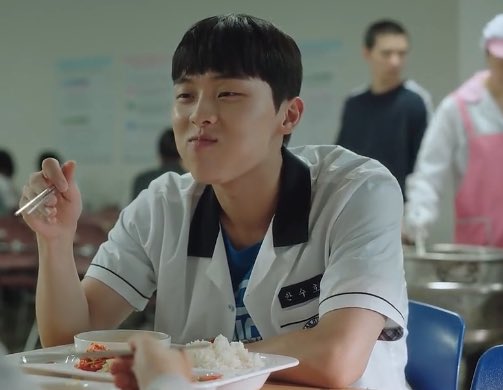
“You always buy stuff! Today hyung will pay for everything!”
The language through which Su-ho cherished these two friends, Si-eun and Beom-seok, was his physical strength and his presence as Su-ho himself.
He naturally showed his role as a protector by having them call him “hyung,” and when Beom-seok kept insisting on paying, he would show Su-ho’s style of care by saying “What, are you always the one buying? Today this hyung will buy everything! Just tell me what you want.”
(Of course, from Beom-seok’s perspective, buying a few… or even dozens of bread and milk from the school store wouldn’t have drained his allowance..)
But Su-ho’s situation was different. Su-ho was a young head of household who had to be responsible for his grandmother’s and his own livelihood… he was a young breadwinner in difficult family circumstances, even watching investment videos at such a young age, so for Su-ho, it wasn’t something he could dismiss as just ‘money.’
He wasn’t accepting Beom-seok’s ‘money’ and taking advantage of his goodwill like Jeong-chan’s group did, but was reciprocating in his own way.
When Beom-seok confessed that he had suffered serious school violence from Moon-gang bullies and even received psychological treatment, Su-ho immediately offered to give up his part-time job and help get an apology.
In Su-ho’s situation and his world, that was great loyalty to a friend, and it was the most sincere and high-level gesture Su-ho could make in showing friendship. But when their fundamental disconnect bubbled to the surface, Beom-seok snapped at him with ‘Are you showing off?’
수호가 시은과 범석, 이 두 친구를 아끼는 언어는 그가 가진 물리적인 힘과 수호 자체로서 (높은 자존감을 지닌) 존재감이었다.
자신을 “형”이라고 부르며 보호자로서의 역할을 자연스럽게 보여줬고, 범석이 자꾸 돈을 내겠다고 하면, “뭐, 맨날 니가 산데? 오늘은 이 형이 다 살게! 말만 해”라면서 수호 식대로의 배려를 보였다.
(물론, 범석이 입장에서 그까짓 매점에서 빵이나 우유 몇 개.. 혹은 수십개를 사더라도 용돈이 매마를 일은 없었을 것이다. 그러나 수호의 상황은 다르다. 수호는 소년 가장이며, 할머니와 그 자신의 생계를 책임져야하는 상황.. 심지어 그 어린 나이에 재테크 관련 영상을 시청할 정도로, 어려운 가정 형편에 놓인 소년 가장인데, 그러한 수호에게는 그까짓 ‘돈’이라고 할 수 없는 범위이다..)
그는 범석이의 ‘화폐’를 정찬 무리들처럼 당연하게 받아들이고 호의를 이용하는 게 아니라 자신만의 방식으로도 보답하고 있었다. 범석이 문강고 일진들에게 심각한 수준의 학교 폭력을 당하여 정신적인 치료까지 받았음을 고백했을 때, 수호는 즉시 아르바이트를 포기하고 사과를 받아주겠다고 제안했다.
수호의 상황과 그의 세계에서 그러한 행동은 친구에 대한 큰 로열티였고, 우정을 보여주는 데 있어 수호가 할 수 있는 가장 진정성있고 높은 수준의 제스처였다. 하지만 이 둘의 근본적인 어긋남이 수면 위로 불쑥 올라올 때, 범석은 이를 ‘생색내냐?’ 라고 일갈했다.
But here’s the tragic irony: every gesture Su-ho made to show care was filtered through Beom-seok’s trauma-informed interpretation system, where actions were analyzed for hidden meanings and potential signs of rejection.
아이러니는 이 지점에서 폭발했다. 우정에 대한 수호의 행동 중심적인 제스처는 범석의 트라우마로 인해 비틀리게 형성된 수많은 감정적인 덩어리들을 통과할 수가 없었다.

The Point of No Return
The moment that crystallized their incompatibility wasn’t the final fight—it was that devastating argument where Beom-seok said, “What, are you trying to get credit from me? Should I pay you for your part-time work?” Su-ho’s face in that moment broke my heart.
Look at Su-ho’s expression when he’s hurt by his friend’s words… Su-ho had big economic struggles, and Beom-seok knew exactly how much those words would hurt. 🥲

그 순간 수호의 표정… 수호는 매우 큰 경제적 어려움을 겪고 있었고, 범석은 자신의 말이 얼마나 수호에게 아프게 꽂혀들지 정확히 알고 있었다…
One of my most insightful subscribers shared this theory: “Even if Yeong-i and Si-eun had never entered the picture, Su-ho and Beom-seok’s friendship would have eventually crumbled.
Beom-seok’s needs were growing exponentially while Su-ho’s capacity to meet them remained constant. It was a mathematical inevitability.“
가장 통찰력 있는 구독자 중 한 명이 이런 이론을 공유했다: “영이와 시은이 전혀 개입하지 않았더라도, 수호와 범석의 우정은 결국 무너졌을 것이다. 범석의 필요는 기하급수적으로 증가하는 반면 수호는 그것을 충족시킬 능력은 일정했다. 그것은 수학적 필연이었다.”
This really hit me because it reframes their story from “what went wrong” to “what was always going to go wrong.” Their friendship wasn’t destroyed by external forces—it was slowly suffocating under the weight of incompatible emotional systems.
이것은 그들의 이야기를 “무엇이 잘못되었는가”에서 “무엇이 항상 잘못될 수밖에 없었는가”로 재구성하기 때문에 정말 와닿았다. 두 소년의 우정은 외부 힘에 의해 파괴된 것이 아니라 양립할 수 없는 감정을 처리하는 시스템의 무게 아래서 서서히 질식해갔다.

Su-ho could never have known that for Beom-seok, their friendship wasn’t just companionship—it was survival.
Beom-seok had attached his entire sense of self-worth to Su-ho’s approval and attention. When that started to waver, it wasn’t just disappointing; it was existentially threatening.
수호는 범석에게 있어 세 트리오의 우정이 단순한 친구 관계가 아니라 생존과 맞닿아 있다는 그 부담스러운 감정의 깊이를 결코 알 수 없었을 것이다. 범석은 자신의 자존감을 수호의 인정과 관심에 붙여놓았다.
From what I could see, Su-ho was just an ordinary boy who maintained friendships the way most teenage boys do.
He would throw light teasing to show affection for his friends, show things through actions rather than emotional words, and he wasn’t the type to deeply analyse every little thing – he accepted or deflected emotions in a one-dimensional way without getting stressed.
(And he didn’t have the circumstances to carry around all those emotional burdens anyway. Su-ho was a young breadwinner working three part-time jobs a week…)
내가 보기에 수호는 대부분의 10대 남자아이들이 하는 방식으로 우정을 이어가는 그저 평범한 소년이었다. 친구들에 대한 애정을 보여주기 위해 가벼운 놀림을 던지고, 감정적인 말보다는 행동으로 보여주며, 사소한 모든 것들을 깊이 따져보는 스타일이 아닌 1차원 적으로 감정을 받아들이거나 받아치며, 스트레스받지 않았다.
(그리고, 그런 감정적인 더미들을 안고 갈 만한 이런저런 여건도 되지 않았다. 수호는 일주일에 파트타임 잡을 3건이나 하는 소년 가장이었으니까…)
But from my perspective, Beom-seok was a completely different boy from the opposite side of Su-ho.
His messed-up childhood seemed to have conditioned him to read all interactions deeply and interpret them negatively, constantly wanting people to explicitly state their approval of him, and constantly watching for signs that someone was going to leave him.
In my interpretation, the unmatured child inside Beom-seok was too wounded to just sit comfortably and accept Su-ho’s easygoing affection at face value.
하지만 내 관점에서 보면, 범석은 완전히 다른 곳에서 온 수호와는 정반대의 소년이다. 그의 엉망진창인 어린 시절은 그로 하여금 모든 상호작용을 깊이 읽고 부정적으로 해석하도록 조정하는 것처럼 보였으며, 사람들이 자신에 대한 승인을 명시적으로 밝혀주길 끊임없이 바라며, 누군가가 자신을 떠날 신호를 끊임없이 지켜보는 것 같았다.
내 해석으로는 범석이 안의 자라지 못한 미성숙한 아이는, 그냥 편안히 앉아 있으면서 수호의 여유로운 애정을 액면 그대로 받아들이기엔 너무나도 상처 투성이였던 것만 같다.
The Mathematical Tragedy
As I write this, I keep thinking about that script book message: “I admired you so much. I loved you so much. I’m really sorry… Su-ho ya…” It captures the entire tragedy—the love was real, the admiration was genuine, and the sorry was necessary.
대본집 메시지를 생각하게 된다: “수호야… 너무 동경했어. 너무 사랑했어. 정말 미안해… 수호야…” 사랑은 진짜였고, 동경은 진심이었으며, 미안함은 당연했다.
Their story wasn’t just about two characters in a drama. It was also about the wounds that come from loving someone in a language the other person can’t understand, the sadness of needing something from someone that they can’t give, and the painful realisation that good intentions don’t always lead to good outcomes.
그들의 이야기는 단순히 드라마 속 두 캐릭터에 관한 것만은 아니었다. 그것은 상대방이 이해할 수 없는 언어로 누군가를 사랑하는 마음에서 터져나오는 상처, 상대는 줄 수 없는 것을 누군가에게서 필요로 하는 슬픔, 좋은 의도가 항상 좋은 결과로 이어지지 않는다는 고통스러운 깨달음에 관한 것이기도 했다.

When you look at the math teacher scene where Si-eun tries to mediate between them, the teacher says: “You know why you’re all bad at math? Because you don’t understand the fundamentals and you’re always just trying to…”
둘 사이를 중재하려는 시은이 너머 수학 교사 장면을 보면, 이렇게 말한다: “너희들이 왜 수학을 못하는지 알아? 기초를 이해하지 못하고 항상 그냥…”
To express the two boys’ friendship in one sentence—trying to solve an equation without understanding that their fundamental premises were incompatible from the start.
두 소년의 우정을 한마디로 표현한다—두 소년의 근본적인 전제가 처음부터 양립할 수 없었다는 것을 이해하지 못하고 방정식을 풀려고 하는 것...
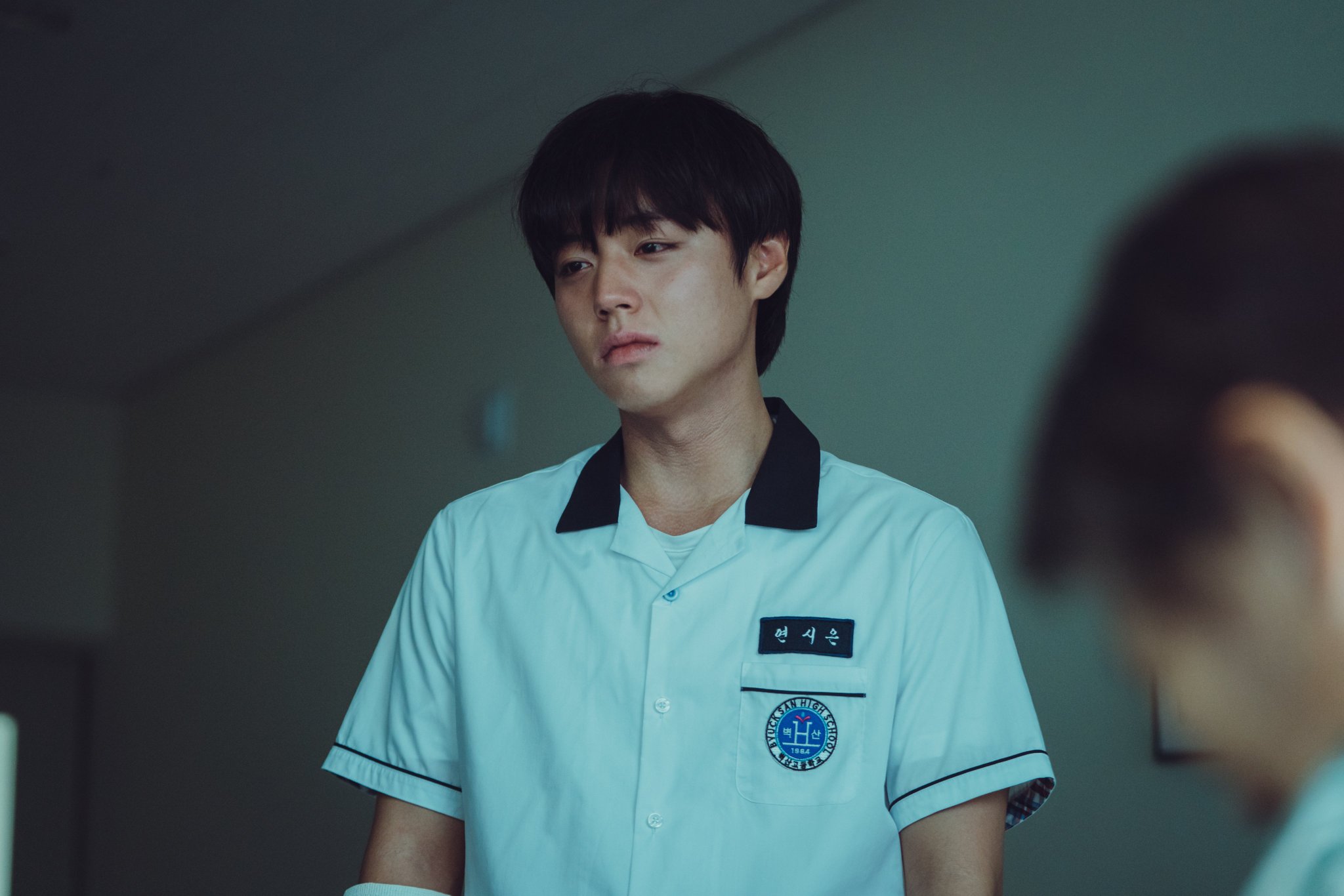
Final Thoughts
If you’re a fan who has watched this drama multiple times, I think you’d know that there’s never a wasted scene… every detail carries meaning.
The brilliance of Weak Hero Class 1’s direction lies in how it makes us warmly watch Su-ho and Beom-seok building their friendship, then concludes their friendship so destructively and shockingly in a way that’s sudden yet all too familiar, showing why two boys with different premises couldn’t work.
이 드라마를 여러 번 본 팬이라면, 낭비되는 장면이란 결코 없고… 모든 디테일이 의미를 담고 있다는 것을 알지 않을까 싶다.
약한영웅 클래스 1 연출의 너무나도 탁월한 점은, 수호와 범석이 우정을 다져가는 모습을 흐뭇하게 바라보게 하다가도, 아주 갑작스럽지만 너무나도 친숙한 방법으로 서로 다른 전제의 두 소년의 우정을 파괴적이고 충격적으로 마무리 시켜버린다는 점에 있었다..
It goes without saying that Weak Hero Class 1 is an excellent masterpiece, but it seems to make many fans unable to forget it for a long time because it deals with the boys’ broken poetry deeply and at a high level across various layers.
This might be uncomfortable for ardent fans of Su-ho’s character, but for me, the scene where Beom-seok kicks Su-ho’s head (though it certainly left cinematic trauma…) is also one of Class 1’s excellent directorial moments.
Su-ho and Beom-seok’s friendship was unsustainable from the beginning, and if Si-eun hadn’t had that ‘crazy quality’ that Su-ho always responded to and was fascinated by, Beom-seok’s final action probably would have fallen to Si-eun instead.
Su-ho valued, recognised, and loved that crazy quality in Si-eun. That ‘courage’ was a quality Beom-seok never had from the beginning and was a huge source of Beom-seok’s inferiority complex.
약한영웅 클래스1이 매우 뛰어난 수작인 것은 말할 것도 없으나 소년들의 부서진 시를 다양한 층위에서 깊이 있고 수준높게 다룬다는 점에서 많은 팬들로 하여금 오랫동안 잊혀지지 못하게 만드는 것 같다. 수호 캐릭터의 열렬한 팬이라면 불편할 수 있겠지만… 나에게 있어서 범석이 수호의 머리를 발로 차버리는 그 장면은 (물론, 여지없이 시네마틱 트라우마를 남겼으나…) 클래스1의 뛰어난 연출 중 한 장면이기도 하다.
애초부터 수호와 범석의 우정은 지속될 수 없었고, 만일 수호가 언제나 응답하고 매료되었던 그 ‘또라이 기질’이 시은에게 없었다면, 아마 범석의 마지막 행동은 시은의 몫이 되었을 것이다.
수호는 시은의 그 ‘또라이 기질’을 높이 샀고, 인정했고, 사랑했다. 그 ‘용기’는 범석이 애초에 갖지 못했던 재질이고 열등감의 근원이었다.
⛔️ Copyright Disclaimer: All drama footage, images, and references belong to their respective copyright holders including streaming platforms and original creators. Materials are used minimally for educational criticism and analysis with no intention of copyright infringement.
🚫 Privacy Policy: This site follows standard web policies and does not directly collect personal information beyond basic analytics for content improvement. We use cookies to enhance user experience and may display advertisements.
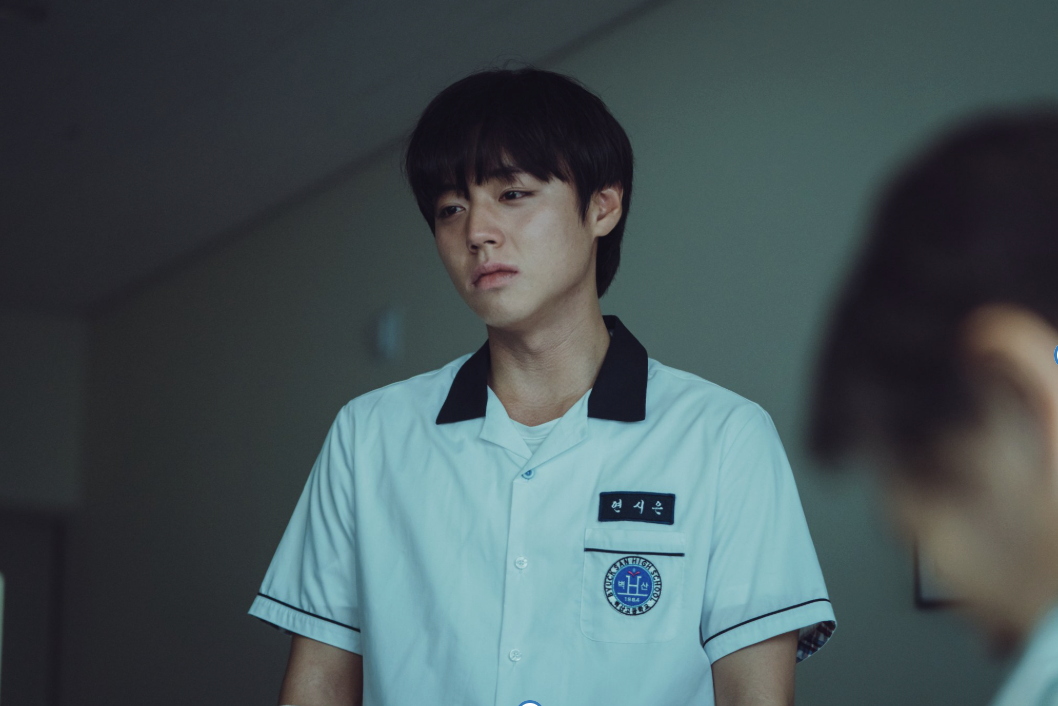
Leave a Reply to jennielee Cancel reply